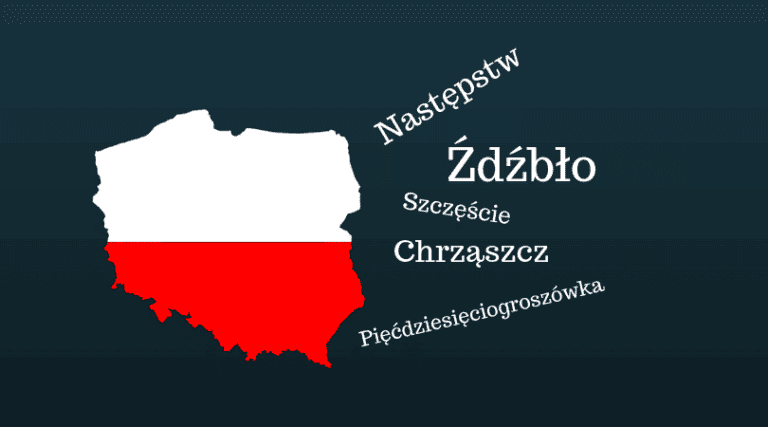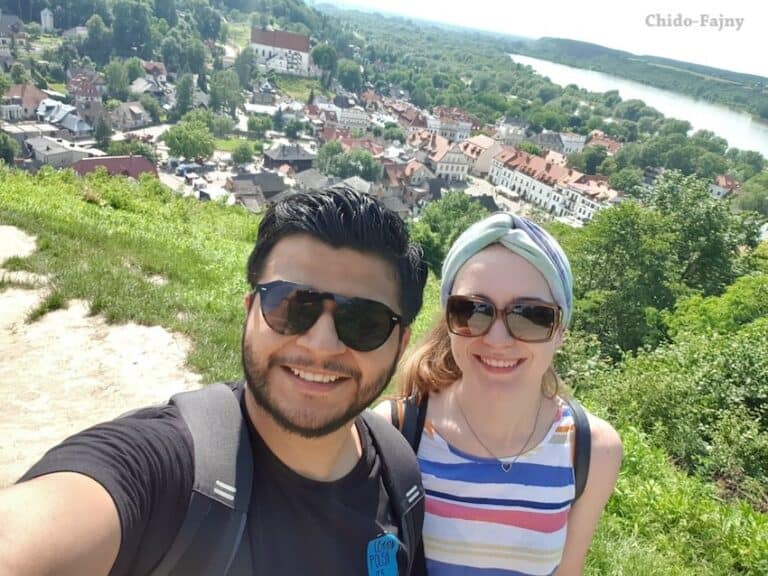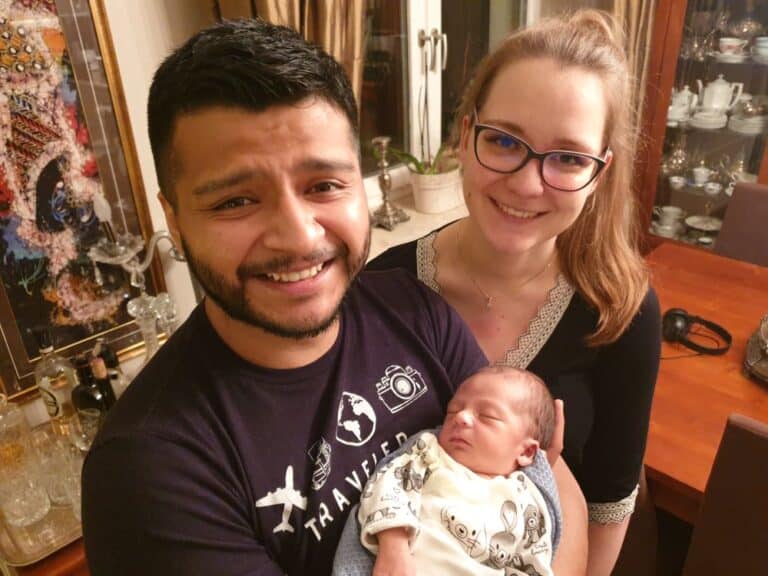Dzień dobry! – This might have probably been one of the first Polish words I heard when I visited Poland for the first time 7 years ago! It was quite easy to learn it mainly because all the Poles are saying it all the time, when you go to the supermarket Biedronka, a Polish restaurant bar mleczny or visiting a Polish family.
But, apart from that, learning Polish has been probably the most difficult thing I’ve been doing during the last few years! Honestly speaking, I’m not talented with languages, the only reason I speak English is because my parents forced me to learn it since I was a child (now I really appreciate this), but you know, at that age I’d have rather play football with my friends or watched my favorite cartoons on TV.
The Unkown Polish Sounds
Polish for most of the Spanish native speakers sounds like a combination of random r and z sounds, with no separation of the words! The thing is that people from Latin America and Spain can basically understand each other without any problem even though they pronounce some words differently.
For example the word cerveza, in Spain they put more emphasis on the ‘S‘ sounds, and in Mexico, for example, this sound is way softer, but at the end of the day – the word is the same.
In case of Polish, this is completely different. Words with e and y, or with w and b, for me some of them sound exactly the same! An example would be words wyjście and wejście. If a Pole reads them I will hear no difference at all, but the thing is that their meaning is completely different!
Wyjście is exit, and wejście is entrance… I mean, why didn’t they create a completely different word for this? In the Polish language, there are hundreds of words with which I have the same problem, so it’s ten times harder for me to learn a new word in Polish.
Sometimes during my Polish lessons, I believe that whoever created this language hated people…
Of course, as in everything in life, there are a few people who are really talented and were able to learn Polish in just a few months! Am I jealous? For sure yes! If I spoke Polish perfectly my life in Poland would be much better I believe!
“You have been living in Poland for a few months, you should be speaking Polish now…!” – One of the phrases I hate the most
Ok, but enough of complaining about the difficulty of the Polish language, we all know it is super difficult and depends only on you if you want to learn it.
The Polish Certification Exam
A few months back I had one of the biggest challenges in my life: Polish Certification Exam, and this is what my post is about! I will tell you everything you wanted to know about it, just keep reading! But first, I want to thank all of my Polish schools and teachers in Poland that helped me during the last 6 years (the order on the list is from my first school till the most recent one):
- Polonus School in Łódź
- Dorota from Polish Polish
- Fundacja Frog
- Kasia Klóska
- Diana from Move up Classes
Do I need to Take This Exam?
Well, let’s start with the obvious: Do you really need to take this exam? If you are planning to get a permanent residence card in Poland or/and eventually Polish nationality you must take and pass Polish certification exam on at least a B1 level!
Since February 2018, one of the requirements for a permanent residence card or Polish citizenship is to have a Polish language certificate! When I heard this for the first time I wanted to cry because I knew I would have to take that legendary exam that is a headache for many of the foreigners who live in Poland.
Luckily for the people that got their permanent residence card prior February 2018, they don’t need to take this test, they can simply renew their card.
If you don’t want to live in Poland forever or you don’t want the Polish nationality, then you don’t need to take this exam (but of course, you still can). If you are from outside the EU (European Union) and want to live in Poland based on studies or work you can check this post where we describe all the documents you need to legalize your stay: Legalize your stay in Poland.
When Do We Need to Do This Exam?
As I mentioned before, you must take and pass this exam for one of these reasons:
- You want a permanent residence card (karta stałego pobytu)
- You want Polish citizenship
- You are crazy, you like challenges and you have a lot of free time.
Generally speaking, in order to apply for a permanent residence card you must live in Poland for at least 5 years in a row! And for Polish citizenship, you must have lived in Poland for at least 10 years in a row. Of course, I’m just referring to a case when you have no blood ties with Poland (meaning none of your parents or ancestors was Polish). You can read more about the general requirements here: Polish Citizenship: How to Get It?
Is The Exam Free of Charge?
Like all the good things in life: nothing is free and what is delicious makes you fat… you have to pay to take this exam! It’s obvious but if you pay it doesn’t you will pass it. The exam is not cheap, it costs around 600 PLN. Depending on the school where you register, they will tell you where and when to pay.
How to Register for the Exam?
If you are ready to take this exam, you may want to register asap! The reason is that these Polish certification exams are organized only 3 times per year! Normally the exams are in March, June, and November (it may change), so you have to be very organized because the places are limited! Believe it or not, hundreds of people take this exam every year! You can check the calendar of exams on the official website: certyfikatpolski.pl.
If you want to register you need to find a Polish school that offers this possibility, but please pay attention to this: NOT all of the Polish schools in the country can organize it! So just double check first here: Institutions where you can take the exam. In my case, I registered at Fundacja Nauki Języków
Obcych Linguae Mundi.
All of the schools publish in advance the requirements and dates of registration, so please check them all! When I tried to register in three schools in Warsaw, they had no places left!
What does the exam look like?
So now let’s go with the good stuff! What does the exam look like? One day before my exam I decided to stop studying Polish, otherwise, my brain would have had a system overload! I just had a quiet night, watching Netflix and that’s it. On the day of the exam make sure to have with you: your passport, two or three pens, and your greatest prayers.
The exam took place in a public school close to the city center (I thought it was supposed to take place in the school I registered, but no), I arrived like 30 minutes before the exam, when I entered to the building there were a lot of people! At first, I thought that they were people waiting for their family to register for the exam or something, but no, all of these people there were taking this exam. The line to register was quite long so you better arrive on time, otherwise, you might be risking a lot!
It might seem obvious but I thought someone would speak English there (don’t laugh at me), but no, all the instructions, all the papers, everything was in Polish! On the walls, there were lists with all of the people who registered and information for them, including the room where they would have to take the exam. 98% of the people were from Ukraine or Belarus, there were only a few people from other countries, the ones I remember were: one Latino (me), one guy from India and one guy from Asia.
As there were many candidates, the registration tables were divided depending on the letter of your last name, when you were in the correct line and ready to register, the person in charge asked to: Turn off your cell phone and put it in a plastic bag, when the exam is over you will be able to pick it up. So if someone was planning to cheat with his/her phone, that wouldn’t happen.
When we entered the main room, they gathered us at the front (around 130 people), and they started to give the instructions for the exam and other useful information. Of course, all of the info was in Polish. After the instructions, we had to look for our place and sit there, then a few people would be checking one by one the passports of each applicant (no joke: they check your passport like 4-5 times during the exam), they checked my passport more times than when I was entering to the European Union.
Sections of the Polish Exam
If you didn’t know the whole exam consists of five sections: listening, writing, reading, grammar and speaking. There are two scenarios (it depends on the school you register): you will have the exam in two days, or just in one day! I only had the exam in one day, so if it’s the same for you, be prepared to be there at least 6 hours.
For each section, a person will be giving new papers with instructions, which means that you don’t have the whole exam at the same time.
Now let’s cover the sections:
- Listening (difficulty: 6/10): as far as I remember this was the first section of the exam. As soon as the recordings are played they will not stop till the end of the section. So really pay attention!
- Reading (difficulty: 5/10): this was quite easy for me, the exercises were not that hard to understand, just make sure you double check each word!
- Grammar (difficulty: 10/10): Oh my god! This part was nuts! I wanted to cry, it was extremely difficult! A lot of exercises where you must prove that you actually speak perfect Polish! Remember all those grammatical cases? Well, they will be on the exam!
- Writing (difficulty: 8/10): for the writing section you will need to write one short essay and one long essay (one page more or less). The thing is that if they tell you: write 40 words, you must write a MAXIMUM of 40 words… if you write 60 words they will start removing points for each additional word. So before you write, think clearly what you want to write.
- Speaking (difficulty: 7/10): you will enter alone to a room with one or more Polish professors, you will have like 3 exercises, each of those is to describe a situation, for example: describe what’s in a specific picture, tell a story or something like that. The advice my teacher gave me was to never stop talking, and to try to say all the things you can.
When Do I Get The Results?
First, let me tell you in order to pass the exam you must have at least 50% of correct answers in each section of the exam. This means that, for example, if you got 100% correct answers in 4 sections, but 30% of correct answers in the listening section, you will not pass it!
Now, people don’t really know when you will get the results, when I asked around they told me: “We don’t know but probably in January”, so this meant 2 months after I did the exam. In reality, I got the results after 4 months! But finally, I have in my hands this beautiful certificate that will allow me to apply for a permanent residence permit soon!
My scores were not the best but here they are:
- Listening: 87%
- Grammar: 50%
- Reading: 90%
- Writing: 67%
- Speaking: 90%
Tips For The Exam
When people knew that I passed this exam successfully they asked me a lot: “What is the secret? What did you do? Please give me tips to pass it! etc.”
Well, unfortunately, there is no such thing as a magic secret. I had been preparing for this exam for almost one year. The best advise I can give you is to enroll in an individual course where they prepare you for this particular exam! I think if you take regular Polish lessons and you want to take this exam it won’t be enough in my opinion.
Just like the course I took with my teacher Diana, she prepared me with a lot of exercises similar to those that would appear on the real exam. I got familiar with the exercises, the time you need per exercise, how to talk non-stop for 5 minutes for example and things like that. It is super important that you get familiarized with similar exercises, otherwise, you might get confused or surprised.
Also, as I heard from many people, guys from Ukraine speak really good Polish after just a few months of living in Poland, but this doesn’t mean that they are experts in Polish grammar for example. And this is a real problem! Many people failed this exam because they never wrote in Polish, or because they don’t know how to conjugate a word depending on the grammar case. You must study a lot of Polish grammar, but seriously a lot! You can learn by heart a few structures that might help you during the writing or speaking sections.
You can’t enter the exam with any bag, but you can leave it somewhere outside the room. Take a bottle of water or some snack with you, because they will give you a short break of 15 minutes, so it’s good not to be hungry so you can focus better.
Finally, try to relax, prior to and during the exam. This might sound stupid but there is no reason to stress yourself out. If you prepared well for the exam you will do great! I mean, I was able to pass it, so for you sure you can do it as well!







6 Comments
Can you connect me to your teacher Diana, I’m thinking to take this exam next year.
Sure thing! You can contact her on her Facebook Page: https://www.facebook.com/moveupclases/
bravo.my friend .najbardzi trudny język exam .moim zdanim.4 lata jestem w polsce ,ale naprawda ja nigdy nie znam taki trudny język.cały czas tylko SZ albo Ż.Można powiedzić ty jesteś bohatir.powinnin być nagroda dla ciebie.Ja dokładny rozmawia Grecki.Angelieski Turcki I oczywyści mój Język Urdu.Ale trudny dla mnie tylko Polski.Mam nadzię będzie dobrze po 100 lat.
Bhai jan apna number message kro may b poland may rehta hu aur study kr rha hu exam ki agr aap ko munasib lgy tu kuch mil kr diacuss krty hain
Moon.bytom@gmail.com ye mera email hai
Thanks brother its help me alot best of luck I hope I will pass too